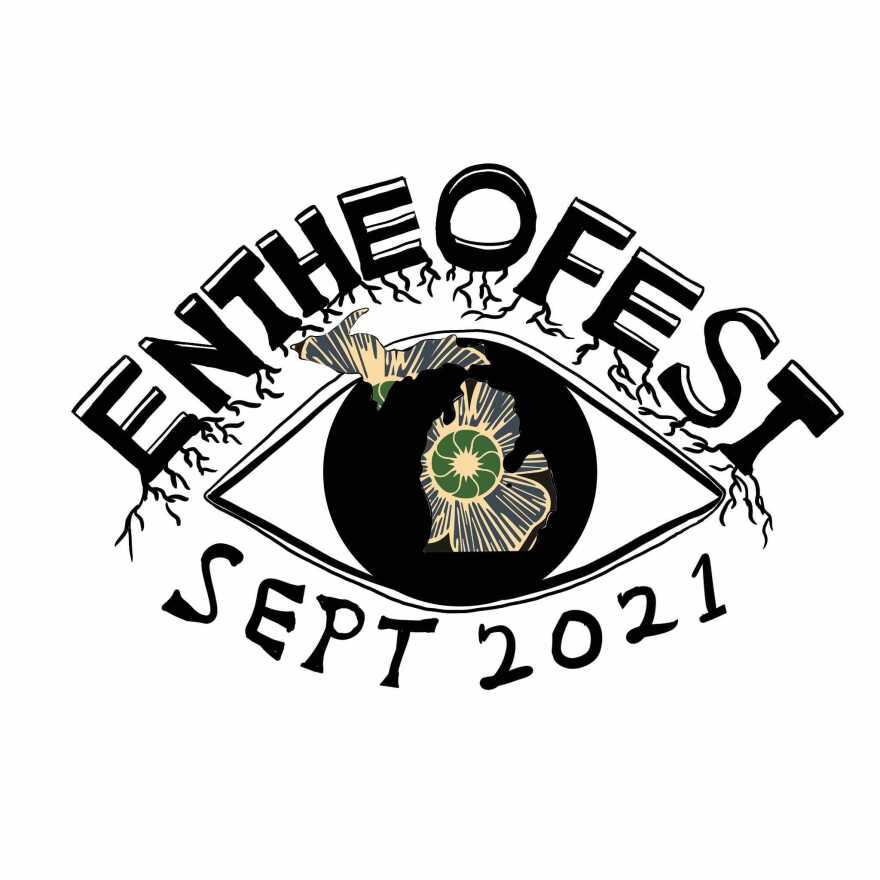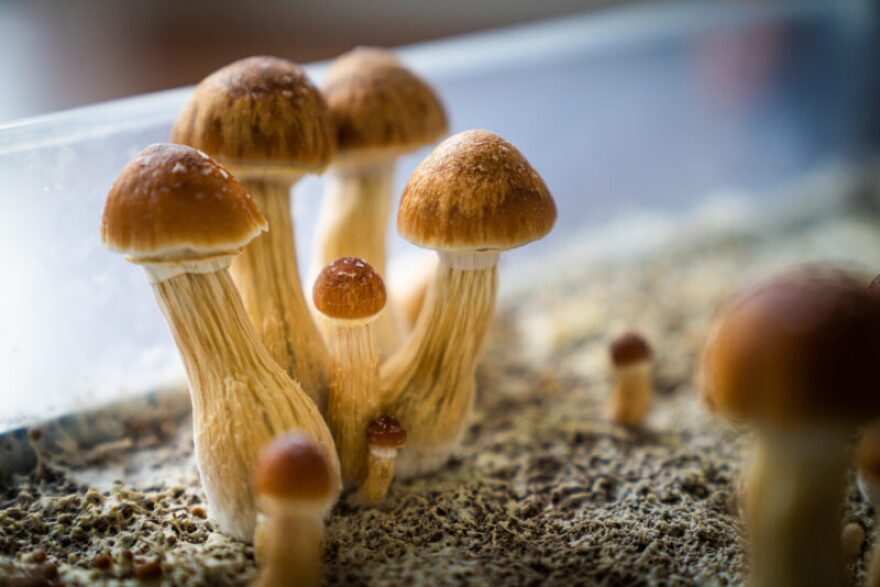Psychedelic plants and fungi have been used for health and spiritual purposes for thousands of years. In September, they will be celebrated, as the Ann Arbor City Council recently approved "Entheo Fest" to take place on the University of Michigan diag.
WEMU's Lisa Barry talks with Julie Barron, co-director of “Decriminalize Nature Michigan,” about the event and the use of mushrooms and plants for our well being.
TRANSCRIPTION:
Lisa Barry: Ann Arbor has been known for its annual Hash Bash event, recognizing the use and legalization of cannabis for decades. I'm Lisa Barry. And now, a new event is planned for next month in the city to increase awareness about the use of psychedelic plants and mushrooms for mental and physical health improvement. We're joined by Julie Barron, co-director of Decriminalize Nature Michigan, to talk more about the event. Welcome, Julie. Can you first begin and tell us about your organization?

Julie Barron: So, we started as Decriminalized Nature Ann Arbor, and we were working to decriminalize entheogenic or psychedelic plants and fungi here in the city of Ann Arbor. We accomplished that in September of 2020. And then we turned into Decriminalize Nature Michigan. And now, we are helping other cities in Michigan decriminalize at their local level. And we're also working on a statewide bill that will be introduced here in the fall to decriminalize statewide.
Lisa Barry: And where does nature come into this?
Julie Barron: When we say entheogenic plants and fungi, or we say psychedelic plants and fungi, we're talking about those that come from the ground. We're talking about plants containing DMT. We're talking about cacti containing mescaline, like San Pedro or peyote. We're talking about iboga, which is a bush. We're talking about psilocybe mushrooms. So, all of the things that we are working to decriminalize or have already decriminalized are things that are growing out of the ground coming from nature.
Lisa Barry: We just recently made the use of marijuana legal in Michigan. How would you compare the use of psychedelic plants and fungi to using marijuana?
Julie Barron: people using them for health purposes and for spiritual growth and personal development. So, there's a lot of similarity. But one main difference is, I would say, most commonly people are using cannabis more frequently than they would use something like an entheogenic plant or fungi, but they're very, very similar and can also be used recreationally.
Lisa Barry: And whether people realize it or not, cannabis use goes way, way back. Is there of that same history with the use of mushrooms and plants?
Julie Barron: Without question, yes, without question. There are some very, very old historic information--cave paintings even--showing the use of mushrooms. But yeah, they go back through indigenous traditions for ages.
Lisa Barry: Sometimes, when you hear about people using mushrooms, they talk about some really, I just call it, out there experiences. Is that what you're advocating for?
Julie Barron: Yeah, well, there's a couple of different ways to use them. One of them would be to really immerse yourself into a full experience. And, yes, that is similar to what you're talking about. Then there's also people use them in micro doses. So, there's sub-perceptual, and they can use them more frequently but don't have to go through a whole psychedelic experience necessarily to get their benefit.
Lisa Barry: So, there are some medicinal benefits of mushrooms?
Julie Barron: Oh, absolutely. They're very, very medicinal. Yes.
Lisa Barry: Can you give us some examples?

Julie Barron: Yeah. So, I'm trained as a therapist, and I work with a lot of clients who are using mushrooms for their emotional health. Research, specifically right now that's out, is showing very strong support for the use of entheogenic plants and fungi for depression, anxiety, PTSD, addiction. It also really helps to reduce recidivism--people returning to jail or returning back into the justice system over and over again. Really incredibly profound benefits. And the research is just outstanding in this area.
Lisa Barry: So, when you say using mushrooms, I'm going to try to be funny here. I like mushroom soup, but I don't think that's what you're talking about. How does one use mushrooms?
Julie Barron: It's a very specific type of mushroom. We're talking about psilocybe cubensis. And I think there's other varieties I'm not as familiar with. But the active ingredient in these mushrooms is psilocybin. That's what makes it psychedelic or entheogenic is the psilocybin, specifically, in these mushrooms. And they do grow in Michigan. There's, I think, 12 to 14 species of psilocybin mushrooms that grow here native in Michigan,
Lisa Barry: I mean do you smoke them? Do you eat them?
Julie Barron: You eat them. You eat them. Correct. Or you can drink them in tea.
Lisa Barry: And how easy are they to obtain right now to buy or purchase?
Julie Barron: Well, you know, that would be on the underground. So, the bill that decriminalized here in Ann Arbor did not decriminalize for commercial sales. We decriminalize use, possession, cultivation, sharing, transportation, but we did not decriminalize commercial sales. And so, you can either grow them yourself, or you can have a friend grow them and share them with you.
Lisa Barry: Is that something you're working towards?
Julie Barron: Well, I think it will come. It is definitely not something that we are working at the current time. You know, the commercial sales--that's probably going to come, that's probably going to be very likely pushed by big corporate groups that come in kind of like cannabis, when all of a sudden, just like now, we have this retail cannabis sales, and there's really big companies. There's very few Michigan companies still doing it. That push is going to come. Our goal is to make sure that these plants and fungi--nature--as it grows in the ground can be in the hands of all people who wish and want to use it. And so, our goal really, as a super grassroots organization, is just to make sure that the average person and the people who are the most at risk, the people who have the harder time accessing health care and accessing recreational things, once it's got to you have to have a license and it becomes expensive, right? We want everyone to have access to the most vulnerable communities. We want to make sure continue to have access for spiritual purposes, for health purposes, and even for recreational purposes if they want to.
Lisa Barry: Have they been proven to be safe and without side effects?
Julie Barron: Yeah, I mean, the safety profile on these entheogenic plans are incredibly, incredibly good. They have very good safety profiles. That's why we're that's why we've chosen what we've chosen to decriminalize, because we really feel very good about their safety profiles and knowing that people can have access. But they are powerful, and we should give them reverence. And so, education, along with decriminalization, is vital.
Lisa Barry: And speaking of powerful, I have heard of people having a, what you call, a spiritual experience with mushrooms that has changed their lives and has put them on different paths. And I feel like, is that dangerous? Do we know enough to decriminalize that and legalize to move forward at this point?
Julie Barron: Yes, I think we do. I really think we do. The one thing that we found out from the 60s, it became really apparent, through research and through people using recreationally, was that you can work with the environment and the setting to actually encourage a more positive experience. And we always tell people have someone with you who knows what they're doing. Don't just take them and go on your own. These plants are powerful. And, like I said, they deserve reverence. Really take some time and plan out what you're doing, make a plan, and have somebody with you, do some work afterward. And, you know, we call it integration to help processing your experience. But, you know, the thing about it, when we ask a question, like, "Do you think it's OK to just decriminalize it and people have access?" You know, there's mushrooms that grow in my front yard. I'm looking at one right now out the window. It's completely poisonous. And if you eat it, you'll get very sick and/or die. So, the thing about these plants and fungi that we're talking about is they're very, very safe. You may have a very profound experience, but they'll wear off and come back. We're talking about substances that grow in the ground, but they're not lethal. They're actually quite safe.
Lisa Barry: So, what do you want to say to people who are thinking, "We don't need mushrooms and psychedelic plants. We already have alcohol and cannabis is legal. Why do we need this? Why do we need mushrooms as well?"
Julie Barron: Well, they don't have to take it. We're not trying to say everybody has to take this. It's like, no, these are plants and fungi that have been used for millennia. It is within our human nature to use these to have altered experiences. And it's also within our human right to be able to use what nature gives us to use. And so, yeah, they're not for everybody. And with that, there are people who need access and people who want access, and they're profound change makers. These really propel people into really healthier ways of living. From my experience, I can tell you that the profound change that happens when someone takes these substances leads to much healthier, much more positive, happier living.
Lisa Barry: And you're a therapist. You've seen that happen.
Julie Barron: Correct. Over and over and over and over.
Lisa Barry: And now there's going to be a festival in Ann Arbor in September. Tell us about that.

Julie Barron: Yes. So, September has become sort of a favorite month of ours here now, because we have the passing of our entheogenic plant resolution in Ann Arbor last September 2020. And then, just a couple of days ago, actually, Ann Arbor City Council approved a resolution designating September as Entheogenic and Fungi Awareness Month. So, there's also a 9/20--September 20th-- is also World Psilocybin Day. And so, you know, we're excited. We kind of want to denote September is Entheogenic and Fungi Month. And so, we have this wonderful "Entheo Fest" that's happening on September 19th at the Diag. It starts at 11:11, it goes up to 2:22. And it's a sacred plant and mushroom free speech event. We're going to have speakers. We have Yousef. Rabhi, who is a House of Representatives member. We have Jeff Irwin, who is a senator. We have city council members coming from Ann Arbor, Grand Rapids, East Lansing, who are speaking. We have decriminalized nature groups from all over. They're local groups from all over Michigan coming. It's going to be a lovely event. We'll have some music. It's free for everybody. It's going to be really lovely.
Lisa Barry: Yeah, we'll put a link to that with more information for those who are interested on our Web page with this interview. Julie Barron, co-director of Decriminalize Nature Michigan. Thanks so much for talking to us on WEMU.
Julie Barron: Thank you so much, Lisa. I appreciate it.

Non-commercial, fact based reporting is made possible by your financial support. Make your donation to WEMU today to keep your community NPR station thriving.
Like 89.1 WEMU on Facebook and follow us on Twitter
— Lisa Barry is the host of All Things Considered on WEMU. You can contact Lisa at 734.487.3363, on Twitter @LisaWEMU, or email her at lbarryma@emich.edu






